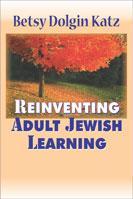An Interview with the author, Dr. Betsy Dolgin Katz ...
As the founding North American Director of the Florence Melton School from 1988, Dr. Betsy Dolgin Katz has a unique perspective and important insights regarding the broad field of adult Jewish learning as well as the significant character of the Florence Melton School. Her new book, Reinventing Adult Jewish Learning, published by Ktav, is part memoir, part professional reflection, and a great read for Meltonians.
1. Why did Avi Chai Foundation award you their prestigious fellowship in order to write this book?
Avi Chai Foundation's mission has been and continues to be to strengthen Judaism, Jewish literacy, and Jewish tradition. They had been familiar with the Florence Melton School of Adult Jewish Learning and its work in the area of Jewish literacy and Israel. Being in a "spend down" stage (the Foundation is ending its North American initiative in 2016), they were looking for ways to sustain their mission when they were no longer active. Having met me through Melton's early work in Parent Education and being aware of the writing I had done in the area of adult learning, they felt that a book featuring the creation, innovations, and expansion of the Florence Melton School of Adult Jewish Learning would contribute to the continuation of their work.
2. Why do you believe Melton succeeded as it did?
From the moment I first became acquainted with Florence Melton and her plan to create a school for adult Jewish literacy, I felt there was a power in her idea that would transform adult Jewish learning as it existed in the 1980's and, in doing so, sustain the shrinking Jewish community in North America. Little did I realize what a prophetess and astute business woman she was. As I researched the history of the post World War II period, the strengths and weaknesses of our contemporary institutions, our relationship with Israel and the nature and needs of American Jews, I saw the vital role the Melton School played. With the destruction of the European Jewish community which had been the heart and soul of Jewish learning, America-the largest remaining community-had to take on that responsibility. It worked moderately well for three decades, but institutions were focused on fundraising for international causes, social life, and children's education. Florence saw a need to strengthen adult learning and make it a priority.
As Federations in North America fulfilled their tasks of supporting civil rights, saving Ethopean Jews and Soviet Jews, they began to take notice of our shrinking Jewish population due, according to researchers, to the end of major immigration and increased assimilation. It was time for "Continuity" and then "Renaissance and Renewal." The Melton School in 1990, having gone through its pilot stage, was ready.
3. Did anything surprise you in your research for the book?
One of the "revelations" while I was writing was the seriousness with which many Jewish adults are pursuing their Jewish journey. The had talked about the importance of literacy, community and fulfilling family roles as motivating factors. In addition, however, a new role played by Melton emerged. No longer simply willing to accept an identity imposed on them (or suggested!) by tradition, by community organizations, by denominational institutions, or by how they were raised; people with whom I spoke, described Melton as a powerful influence on who they were as Jews. Many are experiencing a time of confusion, rootlessness, and instability. They want to study the texts that have provided an anchor to others, study a history that has been a product of similar times, study ethics that will guide them in making decisions in an increasingly nonjudgmental world. Melton allowed them to do this within a safe pluralistic community of people who share those goals.
4. What was most rewarding about writing this book?
I fondly refer to the person who initially contacted me as my "fairy godfather." Personally, writing the book provided me with an opportunity, on one hand, to interact with former colleagues and new professional acquaintances on an entirely new level. On the other hand, it has been a gift to be able to sit quietly and think about my professional legacy. Oddly enough, documenting the past and reflecting on the present has made me a better mentor and teacher of people who will take Jewish teaching and learning into the future.

